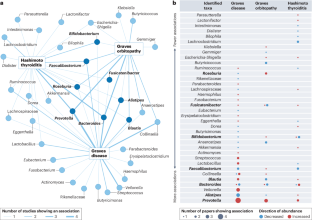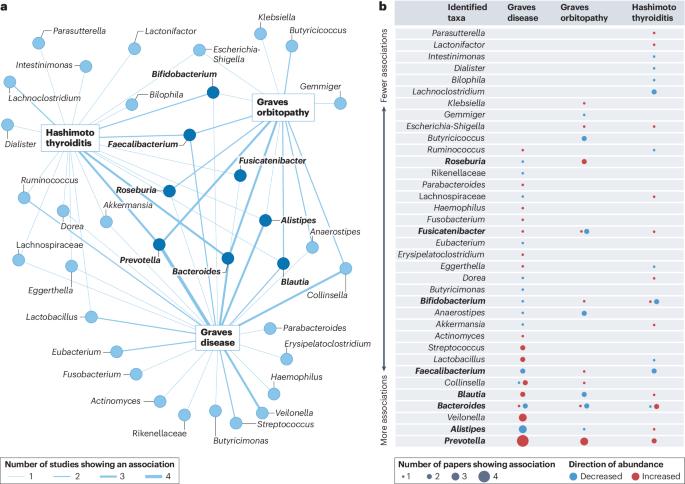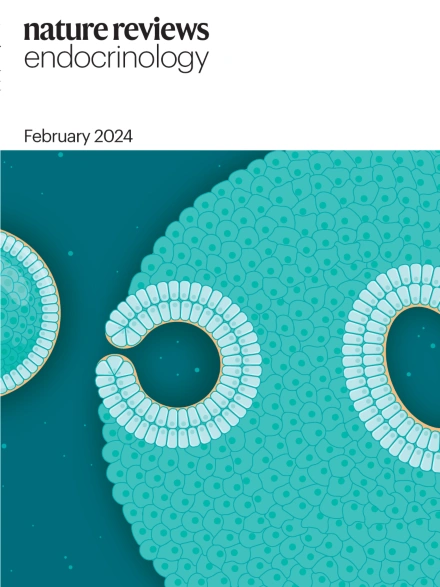The relationship between the gut microbiota and thyroid disorders
IF 31
1区 医学
Q1 ENDOCRINOLOGY & METABOLISM
引用次数: 0
Abstract
Disorders of the thyroid gland are common, more prevalent in women than in men, and range from inflammatory to neoplastic lesions. Autoimmune thyroid diseases (AITD) affect 2–5% of the population, while thyroid cancer is the most frequent endocrine malignancy. Treatment for AITD is still restricted to management rather than prevention or cure. Progress has been made in identifying genetic variants that predispose to AITD and thyroid cancer, but the increasing prevalence of all thyroid disorders indicates that factors other than genes are involved. The gut microbiota, which begins to develop before birth, is highly sensitive to diet and the environment, providing a potential mechanism for non-communicable diseases to become communicable. Its functions extend beyond maintenance of gut integrity: the gut microbiota regulates the immune system, contributes to thyroid hormone metabolism and can generate or catabolize carcinogens, all of which are relevant to AITD and thyroid cancer. Observational and interventional studies in animal models support a role for the gut microbiota in AITD, which has been confirmed in some reports from human cohorts, although considerable geographic variation is apparent. Reports of a role for the microbiota in thyroid cancer are more limited, but evidence supports a relationship between gut dysbiosis and thyroid cancer. The gut microbiota has been implicated in the increasing prevalence of thyroid disorders, including autoimmune thyroid diseases and thyroid cancers, through its effects on gut integrity, immune regulation and thyroid hormone metabolism, as outlined in this article.


肠道微生物群与甲状腺疾病的关系
甲状腺疾病很常见,女性发病率高于男性,病变范围从炎症性到肿瘤性不等。自身免疫性甲状腺疾病(AITD)影响着2-5%的人口,而甲状腺癌则是最常见的内分泌恶性肿瘤。对自身免疫性甲状腺疾病的治疗仍局限于控制而非预防或治愈。在确定易患 AITD 和甲状腺癌的基因变异方面已经取得了进展,但所有甲状腺疾病发病率的不断上升表明,除基因外,还有其他因素参与其中。肠道微生物群在出生前就开始发育,对饮食和环境高度敏感,为非传染性疾病变成传染性疾病提供了潜在机制。它的功能不仅限于维持肠道完整性:肠道微生物群还能调节免疫系统,促进甲状腺激素代谢,并能产生或分解致癌物质,所有这些都与 AITD 和甲状腺癌有关。在动物模型中进行的观察性和干预性研究支持肠道微生物群在 AITD 中的作用,人类队列中的一些报告也证实了这一点,尽管地域差异明显。关于微生物群在甲状腺癌中的作用的报告则较为有限,但有证据支持肠道菌群失调与甲状腺癌之间存在关系。
本文章由计算机程序翻译,如有差异,请以英文原文为准。
求助全文
约1分钟内获得全文
求助全文
来源期刊

Nature Reviews Endocrinology
医学-内分泌学与代谢
CiteScore
42.00
自引率
0.70%
发文量
158
审稿时长
6-12 weeks
期刊介绍:
Nature Reviews Endocrinology aspires to be the foremost platform for reviews and commentaries catering to the scientific communities it serves. The journal aims to publish articles characterized by authority, accessibility, and clarity, enhanced with easily understandable figures, tables, and other visual aids. The goal is to offer an unparalleled service to authors, referees, and readers, striving to maximize the usefulness and impact of each article. Nature Reviews Endocrinology publishes Research Highlights, Comments, News & Views, Reviews, Consensus Statements, and Perspectives relevant to researchers and clinicians in the fields of endocrinology and metabolism. Its broad scope ensures that the work it publishes reaches the widest possible audience.
 求助内容:
求助内容: 应助结果提醒方式:
应助结果提醒方式:


